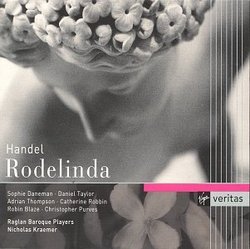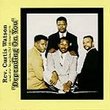| All Artists: George Frideric Handel, Nicholas Kraemer, Raglan Baroque Players, Sophie Daneman, Daniel Taylor, Adrian Thompson, Catherine Robbin, Robin Blaze, Christopher Purves, Alison Bury Title: Handel: Rodelinda / Kraemer Members Wishing: 0 Total Copies: 0 Label: Virgin Veritas (EMI) Release Date: 12/23/2002 Album Type: Box set, Import Genre: Classical Styles: Opera & Classical Vocal, Historical Periods, Baroque (c.1600-1750) Number of Discs: 3 SwapaCD Credits: 3 UPC: 724354527722 |
Search - George Frideric Handel, Nicholas Kraemer, Raglan Baroque Players :: Handel: Rodelinda / Kraemer
 | George Frideric Handel, Nicholas Kraemer, Raglan Baroque Players Handel: Rodelinda / Kraemer Genre: Classical
Rodelinda may be standard-issue opera seria--da capo (ABA-form) arias linked by a plain recitative dramatizing a convoluted plot--but it's among the most compelling works of its kind. Nicholas Kraemer's performance doesn't... more » |
Larger Image |
CD DetailsSynopsis
Amazon.com Rodelinda may be standard-issue opera seria--da capo (ABA-form) arias linked by a plain recitative dramatizing a convoluted plot--but it's among the most compelling works of its kind. Nicholas Kraemer's performance doesn't have all the energy or vocal opulence one might want, but it's certainly the most prettily-sung and stylish Rodelinda available. In the title role, Sophie Daneman's every note is beautiful; her light soprano can't convey fury, but her laments and love songs are exquisite. Both castrato roles are taken by falsettists: Robin Blaze does well as faithful friend Unulfo; Daniel Taylor sings the male lead--deposed king Bertarido--sensitively, but one misses (especially in the bravura aria "Vivi tiranno") the vocal substance a female mezzo using chest voice would provide. Tenor Adrian Thompson, as villain-with-a-conscience Grimoaldo, occasionally struggles with fast passages but makes the most of an emotionally complex role; mezzo Catherine Robbin and bass Chrstopher Purves sing and act their parts with ease and assurance. --Matthew Westphal Similar CDs
|
CD ReviewsOne of the very best Handel recordings gks5q@virginia.edu | 08/06/1999 (5 out of 5 stars) "This is a top-notch recording. The three high voices (Daneman, Taylor & Blaze) are absolutely magnificent. They sing with lightness and elegance that, to me, only add to, rather than detract from, the dramatic import of their roles. Amazon's in-house review, incomprehensibly, wishes for a female mezzo in the role of Bertarido, presumably for the sake of some hypothetical benefits the female chest register may provide. It is especially surprising to see a comment like that coming from a self-described baroque "purist" Matthew Westphal. I am firmly convinced that baroque castrato roles should always be taken by countertenors. And when the countertenors are as good as Taylor and Blaze, who can, in good conscience, complain? Daniel Taylor was a real discovery for me. I knew he existed, but I never before heard him sing. I was really thrilled to hear that he sounds like a new David Cordier, only better because Taylor's voice is not only divinely pure but is also more smooth and supple than Cordier's. Robin Blaze as Unulfo only confirmed my impression of him as the finest countertenor of his generation. I would compare him to Dominique Visse, but without Visse's distinctive "snarl" that puts off many people. Sophie Daneman is my kind of soprano, her voice is airy and focused like a piccolo. All three of these soloists show mastery of Handel's music, delivering well-measured emphases in place of bravado which is apparently expected by people like Westphal. In addition to these three soloists, mezzo Catherine Robbin and bass Christopher Purves do a good job as Eduige and Garibaldo respectively. In such a fine company, only the Grimoaldo of Adrian Thompson (who is, however, a perfectly good tenor) is a bit under par. This is definitely one of the most memorable recordings I've heard in a long time. You must hear it for yourself!" Disappointing considering the talent involved J. Kauffman | Haddonfield, NJ USA | 01/02/2005 (2 out of 5 stars) "Very "prettily" sung, but this opera needs much more than that. This whole performance has a limp quality to it with the soloists and conductor dotting all the i's and crossing all the t's but losing the drama as well. I went back to the 0ld Sutherland from 1959 - wrong language and wrong voice types but everyone means what they sing and the same goes for the old Westminster recording which has a lot more impact than this. Very disappointing overall. Jay" A little bland and toothless ... Mr Richard Fitzsimmons | Scotland | 10/12/2005 (4 out of 5 stars) "After the star-studded, and romantic, accounts of Rodelinda of the past, including Joan Sutherland as the heroine, and Janet Baker as Eduige, this is the first British historically informed account of Handel's psychological and passionate drama.
One of the triumvirate of 'great' operas of the mid-1720s (alongside Tamerlano and Giulio Cesare), Rodelinda is possibly the deepest of Handel's creations. On the one hand, the 'baddies' Grimoaldo (Adrian Thompson) and Garibaldo (Christopher Purves), on the other the Lombard king Bertarido (Daniel Taylor) and his queen Rodelinda (Sophie Daneman), with the king's sister Eduige (Catherine Robbin) and his henchman Unulfo (Robin Blaze) in the middle of the action. This is a slightly disappointing reading of this dramatic work, precisely because it came not out of a staging of the work, but a number of concert performances, and one gets the sense of a 'concert in dress' here, with 'safe' tempi being struck and everything played 'nicely'. The playing is stylish and understated, but a little boring as a result and the dramatic scenes lack enough bite. The singing is uniformly good throughout. Sophie Daneman uses very little vibrato and produces a clear bell-like sound, though a few more colours might have conveyed Rodelinda's character more effectively (see the Glyndebourne account of Maria Antonacci on video). Adrian Thompson is a convincing tyrant Grimoaldo, and Chris Purves a blustering Garibaldo who seeks at the end to betray his master and marry Bertarido's sister Eduige, though foiled at the end by Bertarido himself. Catherine Robbin copes well with Eduige's rather limited part, and Robin Blaze skips through some very awkward passage work in Unulfo's rather trickier castrato part. Though Daniel Taylor is one of the more stylish and refined countertenor voices around at the moment, his clear tone is rather less suited to dramatic roles such as Bertarido. After all, the part was written for one of the 18th Century's more expressive castrati in Senesino - Taylor's account lacks a little oomph behind it to portray the complex emotions of the wronged monarch, though he is stylish and clearly finds singing the notes easy enough. Andreas Scholl on the Glyndebourne video from 1998 is an altogether more convincing Bertarido. So, what we have here is an important addition to the Handel discography, though slightly cut. Any serious Handelian would not be without it in his/her collection. " |

 Track Listings (21) - Disc #1
Track Listings (21) - Disc #1
